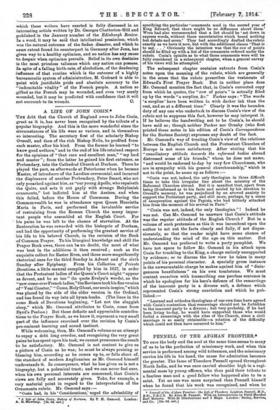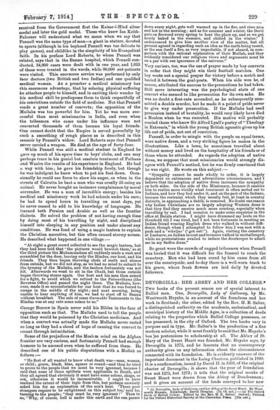PENNELL OF THE AFGHAN FRONTIER.• To cure the body and
the soul at the same time seems to many of us to be the perfection of missionary work, and when this service is performed among wild tribesmen, and the missionary carries his life in his hand, the cause for admiration becomes the greater. The fame of Theodore Pennell spread throughout North India, and he was once carried shoulder high in a regi. mental mess by young officers, who thus paid their tribute to a fearless man and a good fellow who happened also to be a saint. Yet no one was more surprised than Pennell himself when he found that his work was recognized, and when he
• rennett of the Afghan Frontier the Life of Theodore Leighton Pennell, M.A. B.Sc., F.H.B.& By Alice M. Pennell. With an Introduction by Field-Marshal Earl Roberts. With 20 Illustrations and 2 Maps. London Seeley, Service. and Co. ClOs. Bd. net.] received from the Government first the Kaisar-i-Hind silver medal and later the gold medal. Those who knew Ian Keith- Falconer will understand what we mean when we say that Pennell was the same type of man—a giant in stature, devoted to sports (although in his boyhood Pennell was too delicate to play games), and childlike in the simplicity of his Evangelical faith. In his preface Lord Roberts, to whom Pennell was related, says that in the Bannu hospital, which Pennell con- ducted, 34,000 cases were dealt wills in one year, and 1,655 of these were treated in the wards, while 86,000 out-patients were visited. This enormous service was performed by only four doctors (two British and two Indian) and one qualified medical' woman. As a preacher a medical missionary has this enormous advantage, that by solacing physical suffering be attaches people to himself, and in exciting their wonder by his medical skill be predisposes them to think respectfully of Axis convictions outside the field of medicine. Not that Pennell made a great number of converts; the opposition of the Mullahs was too powerful for him. Yet ho was more sue- oeasful than most missionaries in India, and even when the tribesmen who came under his influence were not converted thousands of them became his loyal friends. One cannot doubt that the Empire is served powerfully by snob a smoothing of rough places as is described in this memoir by Pennell's widow. Lord Roberts says that Pennell never carried is weapon. He died at the age of forty-four. While Pennell was still a medical student in England he gave up much of his spare time to boys' clubs, and one may perhaps trace in his genial but resolute treatment of Pathans and Wazirs the results of his experience in England. He had a way with him ; he gave his friendship freely, but though he was indulgent he knew when to put his foot down. Occa- sionally he could use force to show his anger, as when in the streets of Calcutta he beat a man who was cruelly ill-using an animal. He never bought an insincere complaisance by moral surrender. He was a man of incredible energy; besides his medical and missionary work he had schools under his care; be had to spend hours in travelling on most days, yet be never ceased to add to his knowledge of languages. He learned both Persian and Arabic as well as the frontier dialects. He solved the problem of not having enough time by doing most of his travelling by night, and disciplined himself into sleeping in any position and under almost any conditions. He was fond of using a magic lantern to explain the Christian narrative, but this often caused stormy scenes. He described what happened in one village :— "At night a great crowd collected to see the magic lantern, but they had been told that • the pictures would bewitch them,' so at the third picture the Muhammadans all suddenly made a rush and scrambled for the door, leaving only the Hindus, our host, and his friends. They then began throwing clods of earth and stones from outside, but we did not stop, as we had no mind to submit to the tyranny of the Mullahs, and the lantern fortunately was not hit. Afterwards we went to sit in the Chan, but those outside began throwing stones again. Our host and his men then armed for a fight, to avoid which we retired to the Petwarkhanu (the Revenue Office) and passed the night there. The Mullahs, how- ever, made it as uncomfortable for our host that he was forced to escape in the middle of the night ; and next morning, being unable to hear anything of him, we had to start off to Bannu without breakfast. The sale of some Gurmukhi Testaments to the Hindus was at any rate some solace to us."
George Borrow in Spain never sold his Bibles in the face of opposition such as that. The Mullahs used to tell the people that they would be poisoned by the Christian medicines. And when a convert was actually made the Mullahs never rested so long as they had a shred of hope of causing the convert to recant through intimidation.
Some of the prejudices of the Moslem mind on the Afghan frontier are very curious, and fortunately Pennell bad enough humour to be amused even when he suffered from them. He described one of his public disputations with a Mullah as follows :—
" He first of all wanted to know what death was—man, woman, or child ; green, black, blue, square or round—and then he tried to prove to the people that we must be very ignorant, because I said that none of these epithets were applicable to Death, and they all agreed that obviously it must have some colour, shape, or sex, otherwise it would be inconceivable. I ought to have realized the extent of their logic from this, but perhaps unwisely asked him for an explanation of the sun's heat. These poor strangers require to be enlightened on this subject too,' said he, turning to the people ; 'they must be..very. ignorant ! ' Then to us, 'Why, of course, hell is under this earth and the sun passes down every night, gets well warmed up in the fire, and rises nice sad hot in the morning; and as for summer and winter, the Devil puts on firewood every spring to heat the place up, and so we get nearly baked in the summer, and chilled in the winter.' I endeavoured to give him another view of the matter, but all present agreed in regarding such an idea as the earth being round, or the sun itself a fire, as very improbable, if not absurd, in com- parison with the rational explanation of their Mullah, and they evidently-considered our religious views and arguments must be on a par with our ignorance of the universe."
Very curious, too, was the use of prayer made by boy converts in order that they might win their football matches. One boy wrote out a special prayer for victory before a match and buried it between the goal-posts. When his side won he, of course, attributed the success to the precautions he had taken. Still more interesting was the psychological state of one convert who seemed to like persecution for its own sake. He was no doubt a first-rate scoundrel, as be subsequently com- mitted a double murder, but he made it a point of pride never to give way under persecution. If the Mullahs had used persuasion instead of brutality, he would very likely have died a Moslem when he was executed. His motive will probably remind those who know Sir Alfred Lyall's poetry of "Theology in Extremist' in which the young British agnostic gives up his life out of pride, not out of conviction.
Pennell, in order to mingle with the people on equal terms, wore native dress, and a very striking figure be makes in the illustrations. Like a lama, be sometimes travelled about without money and lived on the hospitality of his friends or of those whom he attended. As regards the adoption of native dress, we suppose that most missionaries would strongly dis. agree with Pennell's method, but be was firmly convinced that he was right. He wrote on this subject :—
" Sympathy cannot be made wholly to order, it is largely dependent on extraneous and adventitious circumstances, and I believe that the adoption of native dress increases the sympathy on both sides. On the side of the Missionary, because it enables him to realise more vividly what treatment is often meted out to Indians, and how they feel under it, and on the part of the Indians, because the restraint which they usually feel, at least in country districts, in approaching a Sahib, is removed. No doubt one reason why Indian Christians are so largely adopting Western dress is that they find they receive much more courtesy, especially when
i travelling by rail. I had occasion to make some enquiries in the office at Betels station. I might have drummed my heels on the threshold till I was tired, had I not been fortunate in meeting an Indian friend wearing English dress who walked in without diffi- dence, though when I attempted to follow him I was met with a push and a • nikeljao' (' get out!'). Again, visiting the cemetery at Lneknow, an Indian in coat and trousers walked in unchallenged, while no protestations availed to induce the doorkeeper to admit me in my Sadhu dress."
So great were the crowds of ragged tribesmen when Pennell was buried that it was difficult for the funeral to reach the cemetery. Men who had been cured by him came from all over the countryside, and to-day there is a well-worn track to his grave, where fresh flowers are laid daily by devoted followers.











































 Previous page
Previous page